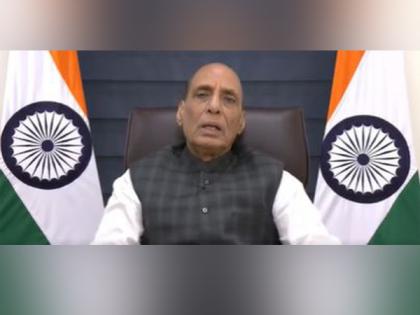Moscow Conf on Int'l Security 2022: Rajnath Singh points at "potential geopolitical fault line in East Asia"
By ANI | Published: August 16, 2022 05:23 PM2022-08-16T17:23:18+5:302022-08-16T17:30:03+5:30
Defence Minister Rajnath Singh on Tuesday took part in Moscow Conference on International Security 2022 virtually and noted that the potential geopolitical fault-line in the maritime domain - particularly in East Asia - could be graver than what we are witnessing today.

Moscow Conf on Int'l Security 2022: Rajnath Singh points at "potential geopolitical fault line in East Asia"
Defence Minister Rajnath Singh on Tuesday took part in Moscow Conference on International Security 2022 virtually and noted that the potential geopolitical fault-line in the maritime domain - particularly in East Asia - could be graver than what we are witnessing today.
"The potential geopolitical fault-line in the maritime domain - particularly in East Asia - could be graver than what we are witnessing today," said at the conference which is attended by Ministers of Defence from different countries as well as experts and key stakeholders in the military field.
Rajnath Singh addressed the conference in a virtual setting. Rajnath recalled that about two years ago many were gathered in Moscow to celebrate the 75th anniversary of the victory in the second world war.
"We remembered with gratitude the sacrifices of our forefathers including millions of Indian soldiers who served the allied armies. The war led to the emergence of the United Nations with a promise to global security, freedom of people and socioeconomic advancements."
Rajnath highlighted that the nations combined their efforts to save succeeding generations from the scourge of war. "All these were to be achieved through multilateral cooperative efforts and by adherence to the charter of the United Nations. Today it is imperative to examine how much of these is achieved and where we fell short of expectations."
Union Minister noted that India is working tirelessly within the framework of the United Nations. "India has been a pioneer in UN peacekeeping since its inception. Have deployed more than a quarter million troops in as many as 49 UN peacekeeping missions. 5500 personnels deployed across 9 missions. Serving under the blue flag 77 brave indian soldiers have made the supreme sacrifice the largest among troops contributing countries."
He stressed that India is representing one sixth of humanity and has contributed relentlessly to the global security under the UN charter. The Minister said that India is committed to non discriminatory and verifiable nuclear disarmament.
"India led annual resolution at the annual UNGA titled measure to prevent terrorist from acquiring weapons of mass destruction."
India remained at the forefront of all initiatives many of which led to global conventions and Indian leadership's role in international solar alliance across 107 signatories is a fine example of country's multilateral approach.
He stated that though UN has given countries a platform in a number of areas but clearly there is a confidence crisis in the UN system. "Several global contemporary challenges has come to the fore such as terrorism, radicalism pandemic, calls for a robust multilateral response. All collective effort has fallen short."
"Without contemporary reforms and without democratization in decision making UN might loose its relevance."
Rajnath recalled the clarion call given by PM Modi on the occassion of the 75th anniversary of UN, "For how long will India be kept out of the decision making structure of UN?"
"Reforms in the responses, in the processes and in the very charter of the UN is the need of the hour. It is a fact that the faith and the respect that UN enjoys among the 1.3 billion people in India is unparalleled."
He added, "Global security in the framework of multilateralism requires abiding by the UN charter and principles of Int law which acts as a bulwark against anarchy. India is committed for free, open and secure indo-pacific region that promotes sustainable maritime practices."
( With inputs from ANI )
Disclaimer: This post has been auto-published from an agency feed without any modifications to the text and has not been reviewed by an editor
Open in app